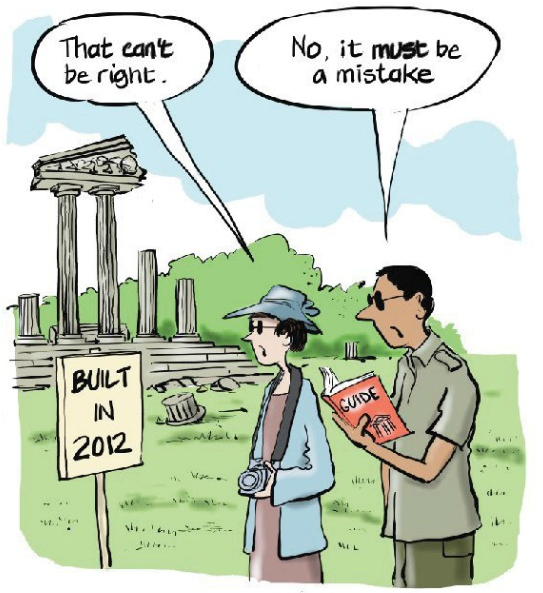
Ленинский пр-т, 32а

Grammar: Modals of deduction
Vocabulary: Buildings
Reading: A more personal place to stay
Video: Meet the parents
Conversation skills: Imagining people’s feelings
Grammar
Modals of deduction
We can use modal verbs to show that we are making a deduction using evidence, not stating a fact:
We must be early. Nobody else has arrived yet.
They work at the same office so they may know each other.
She might not be in. The lights are all out.
That can't be Mark's car. He told me his was in the garage.
Different modal verbs tell us how sure about a deduction we are:
|
It's cold in that house. |
Fact: I know it is. |
|
It must be cold in that house. |
Deduction: I'm sure it is. |
|
It may / might/ could be cold in that house. |
Deduction: It's possible that it is. |
|
It may / might not be cold in that house. |
Deduction: It's possible that it isn't. |
|
It can't be cold in that house. |
Deduction: I'm sure it isn't. |
|
It isn't cold in that house. |
Fact: I know it isn't. |

This bill can't be right. I only ordered a salad.
NOT This bill couldn't / mustn't be right.
There must be a mistake.
NOT There can be a mistake.
She isn't answering the phone. She might be listening to music.
Vocabulary
Houses and buildings
|
accommodation |
a place where you live or stay |
|
attic |
a room at the top of a house under the roof |
|
balcony |
a small area joined to the wall outside a room on a high level where you can stand or sit |
|
basement |
a room or set of rooms that is below ground level in a building |
|
block of flats |
a large building that is divided into apartments |
|
cottage |
a small house in the countryside |
|
doorbell |
a button that you press next to a door that makes a noise to let someone know that you are there |
|
first floor |
the level of a building directly above the ground level |
|
flat |
a set of rooms to live in, with all the rooms on one level of a building |
|
front door |
the main entrance to a building, especially a house, usually facing the road |
|
ground floor |
the level of a building that is on the ground |
|
landing |
the area of floor at the top of a set of stairs |
|
location |
a place or position |
|
lock |
the thing that is used to close a door, window, etc., and that needs a key to open it |
|
move house |
to leave your home in order to live in a new one |
|
neighbourhood |
an area of a town or city that people live in |
|
property |
a building that someone owns |
|
rent |
to pay money to live in a building that someone else owns |
|
steps |
one of the surfaces that you walk on when you go up or down stairs |
|
terrace |
a flat area outside a house, restaurant, etc. where you can sit |
|
view |
the things that you can see from a place |
Useful language
Offers, requests and asking for permission
Polite offers:
Asking for help politely:
Asking for permission:
Imagining people’s feelings